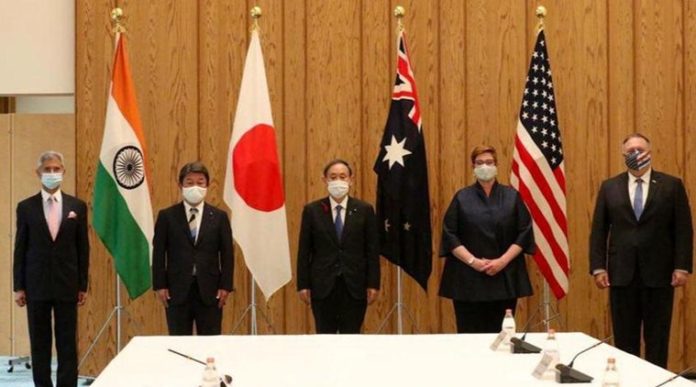Tokyo (NVI): The Quad grouping of India, the US, Australia and Japan today vowed to intensify cooperation to ensure an open and inclusive Indo-Pacific even as a candid Secretary of State Michael Pompeo slammed Beijing’s coercive actions, including against India on the Ladakh border.
The Quad Foreign Ministers met here against the backdrop of growing aggression by China because of which most of its neighbours are troubled and freedom of navigation in the Indo-Pacific region has been hampered.
The Foreign Ministers reviewed “recent strategic developments across the Indo-Pacific and discussed ways to enhance Quad cooperation on maritime security, cyber security and data flows, quality infrastructure, counter terrorism and other areas.
“The four countries reaffirmed their strong support for ASEAN centrality, sovereignty, and an ASEAN-led regional architecture for the Indo-Pacific. They pledged to continue regular consultations to advance the vision of a peaceful, secure, and prosperous Indo-Pacific through engagements among senior officials, subject matter experts, and Ministers,” Principal Deputy Spokesperson of the US Department of State Cale Brown said after the meeting.
Earlier, in his opening remarks at the meeting, Pompeo said he looked forward to “resolving – to renewing our resolve to protect our precious freedoms and the sovereignty of the diverse nations of the region.”
He went on to add, “As partners in this Quad, it is more critical now than ever that we collaborate to protect our people and partners from the CCP’s (Communist Party of China’s) exploitation, corruption, and coercion. We’ve seen it in the south, in the East China Sea, the Mekong, the Himalayas, the Taiwan Straits. These are just a few examples.”
Even though he did not elaborate, Pompeo’s reference to actions in the Himalayas was clearly to China’s aggression launched against India in the Ladakh sector since May. China has amassed huge number of troops along the Line of Actual Control in Ladakh sector and mobilised military assets like fighter aircraft, missile systems and heavy artillery as part of intimidation. India, however, has refused to be cowed down and has carried out matching deployment, with readiness to meet any eventuality, including an armed conflict.
“When we met, now last year, the landscape was very different. We couldn’t have imagined the pandemic that came from Wuhan. That crisis was made infinitely worse by the Chinese Communist Party’s cover-up,” Pompeo said.
He said the Chinese regime’s “authoritarian nature led its leaders to lock up and silence the very brave Chinese citizens who were raising the alarm. America stands with each of you as we work to achieve victory over this horrible pandemic and rebuild our economies together.”
External Affairs Minister S Jaishankar said the fact that the Foreign Ministers were meeting here today in person despite a global pandemic was a testimony to the importance that these consultations have gained, particularly in recent times.
“Our world, you will all agree, is significantly different today than what it was when we met last year in New York in September,” he said, adding, “Now, the events of this year have clearly demonstrated how imperative it is for like-minded countries to coordinate responses to various challenges that the pandemic has brought to the fore.”
He added, “As we collectively navigate these uncharted waters, we seek to emerge from the pandemic more resilient than ever before.”
Underlining that the objective of the Quad member nations remains advancing the security and the economic interests of all countries having legitimate and vital interests in the region, Jaishankar said “as wide-brimmed and pluralistic democracies with shared values, our nations have affirmed collectively the importance of maintaining a free, open, and inclusive Indo-Pacific.”
He went on to add, “We remain committed to upholding the rules-based international order underpinned by the rule of law, transparency, freedom of navigation in international seas, and respect for territorial integrity and sovereignty and peaceful resolution of disputes.”
He expressed happiness that the Indo-Pacific concept has gained increasingly wider acceptance. The Indo-Pacific Oceans Initiative that we tabled at the East Asia Summit last year is a development with considerable promise in that context, the Indian External Affairs Minister said.
Referring to India assuming membership of the UN Security Council next year, he said, “We look forward to seeking collective solutions to global challenges, including global recovery from the pandemic and reform of multilateral institutions.”
Australian Foreign Minister Marise Payne said she looked forward to exchange of strategic assessments and agreements by the four nations on actions to support aligned interests in areas including health cooperation, maritime security, critical minerals and technologies, countering disinformation, and humanitarian assistance.
“This important step in the continuing evolution of the Quad signals our steadfast commitment to working together to promote an open, inclusive, and resilient Indo-Pacific,” she said.
Emphasising that the Quad has “a positive agenda”, Payne said, “We believe in a region governed by rules, not power. We believe in the fundamental importance of individual rights and in a region which – in which disputes are resolved according to international law. And we believe in regional security and recovery from COVID-19 that supports sovereign choices for the countries of the Indo-Pacific.”
Australia is achieving this vision in its engagement across the Indo-Pacific by working closely with ASEAN, by stepping up with the Pacific, including supporting regional institutions such as the Pacific Islands Forum, she said.






